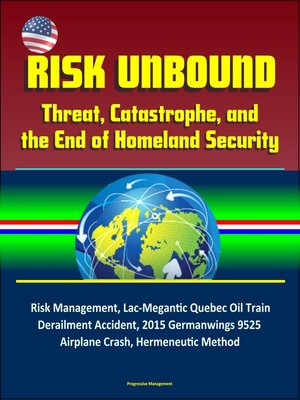Risk Unbound
ebook ∣ Threat, Catastrophe, and the End of Homeland Security--Risk Management, Lac-Megantic Quebec Oil Train Derailment Accident, 2015 Germanwings 9525 Airplane Crash, Hermeneutic Method
By Progressive Management

Sign up to save your library
With an OverDrive account, you can save your favorite libraries for at-a-glance information about availability. Find out more about OverDrive accounts.
Find this title in Libby, the library reading app by OverDrive.



Search for a digital library with this title
Title found at these libraries:
| Library Name | Distance |
|---|---|
| Loading... |
This excellent report has been professionally converted for accurate flowing-text e-book format reproduction. Threat and catastrophe highlight the impossibility of providing perfect security, and demonstrate the limitations of risk-based security practices. This thesis presents an argument in three parts. First, the dangers homeland security agencies confront are increasingly beyond the reach of measures for control. The character of security risks is complex and volatile, while worst-case possibilities—not merely probable accidents and disasters—are particularly relevant to domestic security agencies and organizations. Second, the security response to such unbounded risks has been the creation of unconscionable maps—tools and concepts that presume a greater degree of knowledge, uniformity, and control than is available. Finally, there is a body of knowledge and capability better suited to security uncertainties, and homeland security agencies must find ways to cultivate these capacities. Contrary to current security practices, national adaptability is more desirable than perfect knowledge, control of crisis, or national uniformity.
In order to understand the probability and consequence of a risk, the analysis of that risk must establish an area of study and an area of impact. Catastrophe, like the Germanwings crash, has a knack for acquainting security organizations with previously unforeseen dimensions. As Beck points out, what we do not know becomes the central figure in risk decision-making, not what we know. In 2013, through a series of startling and unseen connections, crude oil from the Bakken oil fields in North Dakota exploded during a train derailment, resulting in 47 fatalities in the town of Lac-Megantic, Quebec. The Lac-Megantic accident demonstrates the way that complex risks can span political boundaries and professional disciplines, challenging the available tools of risk calculation. Homeland security risk, it seems, is often not fully risk at all. It remains as uncertainty and danger. And this is at the heart of a modern challenge to risk-based security practices. If homeland security is predominantly in the business of the unlikely, then it is problematic to think of ordering its capabilities against likely outcomes—even a suite of likely outcomes. So, homeland security professionals must consider and decide whether their work is fundamentally about the management of outliers, and what corresponding shifts this recognition requires in doctrine, theory, and practice.







